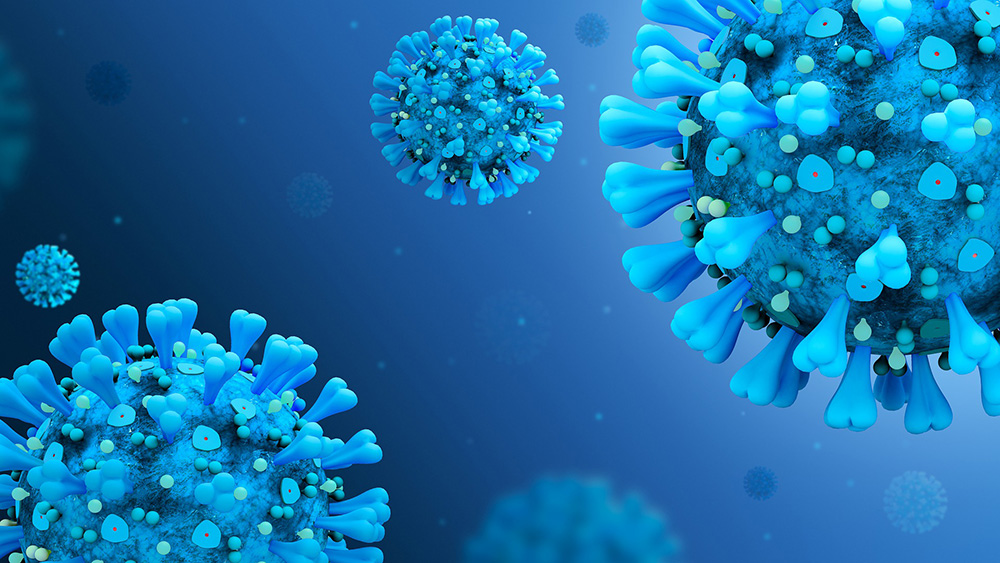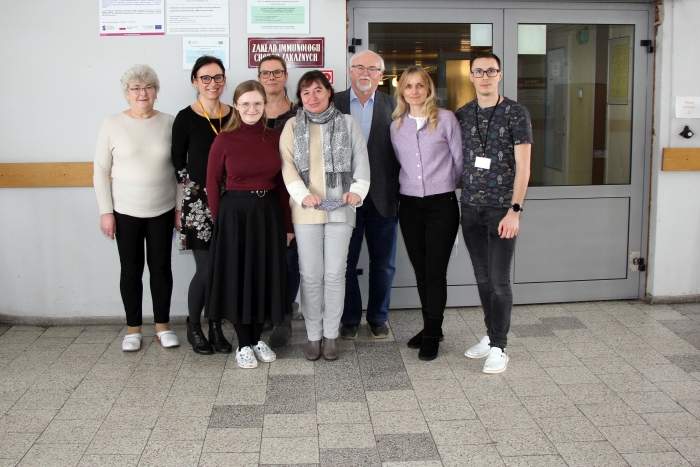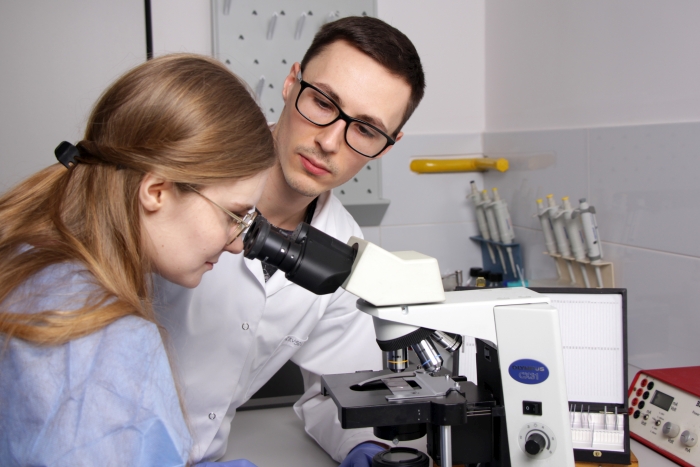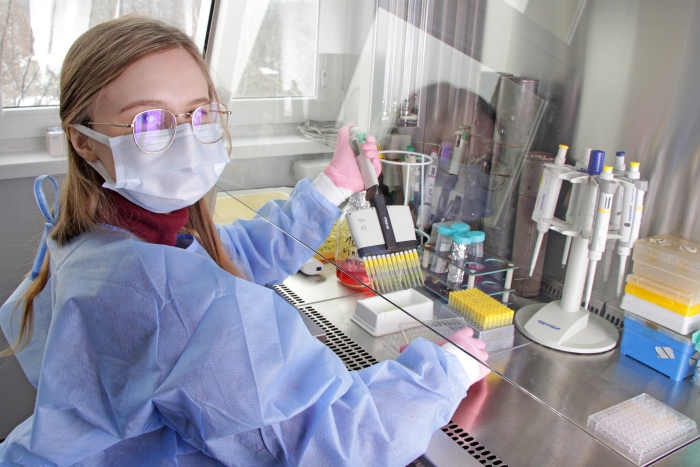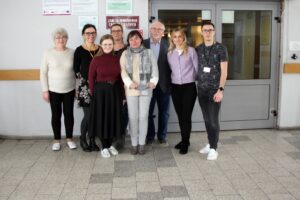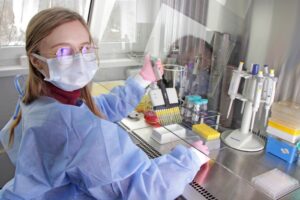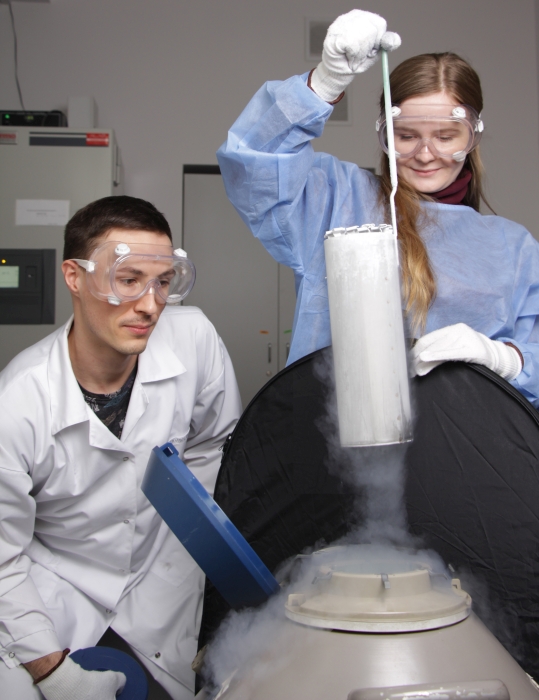 Research profile and current research tasks:
Research profile and current research tasks:
- Evaluation of virucidal and antiviral properties of complex products and chemical compounds of synthetic and natural origin (plant extracts and blends containing active substances of natural origin) against human and animal viruses.
- Evaluation of virucidal and antiviral properties of synthetic and natural preparations against the human coronavirus HCoV-OC43 from the group of β-coronaviruses, which also includes SARS-CoV-2 (COVID-19) and human influenza virus A/H1N1.
- Evaluation of immunomodulating properties of complex products and chemical compounds of synthetic and natural origin in response to viral infection in a model of human peripheral blood leukocytes (PBLs).
- The role of infectious agents (herpes simplex virus, HHV-1, periodontitis) and non-specific immune response in the pathogenesis of Alzheimer’s disease. The importance of sex differences in the activation of peripheral immune cells in patients with Alzheimer’s disease.
- Research on the use of modern anti-cancer therapy with the use of the oncolytic virus VSV (Vesicular Stomatitis Virus).
Commercial research offer
- Evaluation of the virucidal effect of chemical disinfectants and antiseptics used in the veterinary field (precisely according to the PN-EN 14675 standard; quantitative suspension method) using the test organism required in the standard.
- Evaluation of virucidal activity in the medical area of chemical disinfectants and antiseptics (according to the PN-EN 14476+A2 standard; quantitative suspension method) only with the use of an alternative test organism (outside the standard), i.e. human influenza A/H1N1 virus.
- Assessment of the virucidal effect of Textiles according to ISO 18184.
- Assessment of the virucidal effect of plastic and non-porous surfaces according to ISO 21702.
- The possibility of assessing the virucidal and antiviral properties of various preparations and chemical compounds against the human coronavirus HCoV-OC43 from the group of β-coronaviruses, which also includes SARS-CoV-2 (COVID-19).
Pricing and test plan available individually after contact: Dr. Marta Sochocka (marta.sochocka@hirszfeld.pl) or Dr. Beata Orzechowska (beata.orzechowska@hirszfeld.pl).
Acting Head: Beata Orzechowska, PhD, DSc (0000-0002-5125-8947)
Beata Orzechowska, PhD, DSc, is a graduate of the University of Wrocław in the field of microbiology. Since 1995, she has been working at the Virology Laboratory of the Ludwik Hirszfeld Institute of Immunology and Experimental Therapy of the Polish Academy of Sciences (IIET PAS). She earned her Ph.D. in biological sciences in 2001, with her doctoral dissertation focusing on determining the level of natural, innate antiviral immunity in the human body, utilizing a model of infection in human peripheral blood mononuclear cells, which was developed by her. She completed her postdoctoral fellowship at the Oregon Health and Science University (OHSU) in the USA, at the Vaccine and Gene Therapy Institute (VGTI), where she contributed to the development of an animal research model for studying cancers induced by viral infections and identifying potential factors critical in the development of non-Hodgkin lymphomas (NHL). At the Virology Laboratory, she continues her research on innate immunity and focuses on modern cancer treatment methods, including the use of oncolytic viruses and the production of lentiviral vectors for CAR-T cell therapy. She is an expert in the pharmacological activity analyses (adaptogenic, antiviral, immunostimulatory, and cytotoxic) conducted at IIET PAS for compounds of natural and synthetic origin. She holds the title of International Technologist in Molecular Biology MB (ASCPi) and is a certified Laboratory Diagnostician. Lecturer in virology at the University of Wrocław and the Wrocław Doctoral School of the Institutes of the Polish Academy of Sciences.
Orzechowska, PhD, DSc, is the co-author of 38 articles published in indexed scientific journals.
Scientific Staff:
- Egbert Piasecki, PhD, DSc, Associate Professor (orcid.org/0000-0003-2049-4602)
- Marta Sochocka, PhD, DSc, Associate Professor (orcid.org/0000-0002-4073-9606)
- Katarzyna Zwolińska, PhD, Assistant Professor (orcid.org/0000-0002-5872-7806)
Specialists:
- Bogna Jatczak, PhD
- Dominika Franz, MSc, Eng
- Marta Smykała, MSc, Eng
Technicians:
- Halina Markwant
Ph.D. Students:
- Nicole Kryniecka, MSc
- Determination of the immune and microbial background of neurodegenerative diseases.
- Study of basic reactions of the innate immune system such as production and activity of cytokines, studies of non-specific interactions of viruses with the human immune system
- Study of the biological activity of substances of natural origin and synthetic compounds, in particular antiviral and immunomodulatory activity
- The growing interest in the use of VSV (Vesicular Stomatitis Virus) in the treatment of cancer requires precise determination of the safety of this virus in humans. Therefore, it was crucial to identify the leukocyte population that becomes infected with this virus when administered intravenously. The leukocyte populations sensitive to VSV infection turned out to be monocytes and dendritic cells. It was shown that viral replication caused monocyte apoptosis and differentiation into dendritic cells.
- It has been shown that the comorbidity of periodontal disease (PeD, periodontitis) and Alzheimer’s disease (AD) is associated with exacerbation of systemic inflammation.The level of pro- and anti-inflammatory cytokines produced by unstimulated and LPS-stimulated PBLs ex vivo increases with: deterioration of periodontal health and deterioration of cognitive functions.It is therefore justified to treat periodontitis as a modifiable risk factor for cognitive disorders and dementia, and early treatment of periodontitis may limit the severity and progression of cognitive deficits.
- The degree of resistance of PBLs to VSV infection (level of innate immune response) is correlated with the degree of clinical severity of AD. The sensitivity of PBLs to VSV infection increases in patients with AD ranging from mild to moderate to advanced disease. This indicates a deepening deficiency of innate immunity and indicates that PBLs resistance can be considered a promising marker of AD progression. Significant differences were found in the production of cytokines by cells sensitive and resistant to VSV infection, which also indicates impairment of innate immune mechanisms in AD patients.
- Therapy with a complex of proline-rich polypeptides (PRP) enhances the innate immune response of PBLs and reduces the production of pro- and anti-inflammatory cytokines, and thus reduces the pro-inflammatory activity of leukocytes, especially in patients with advanced AD. These findings may be of key importance in the context of the potential use of immunomodulatory therapy in patients with AD and indicate PRP as a promising agent in future therapies for neuroinflammatory diseases such as AD.
- Peripheral immune cells (PBLs) of women with AD show a lower level of innate immune response (after viral stimulation) and produce lower amounts of cytokines compared to men with AD. There were no sex-differences in leukocyte activity among healthy age-matched controls. In people suffering from AD, especially women, there is probably a persistent low-grade inflammatory response (chronic inflammation), which is believed to be related to chronic infections. The discovery of sex-differences indicates that patients’ sex should be considered as a biological variable in the course of AD, as it may be the basis for the future personalized treatment.
- Studies with extract of Ginkgo biloba (EGb) have shown that it has a specific antiviral effect against human herpes viruses – HHV-1 and HHV-2, blocking their spread from cell to cell. EGb is a promising preparation that may support current herpes therapies, especially in the treatment of skin ailments during recurrent infections. A combination of antiviral agents with different molecular targets, including EGb, has the potential to reduce HHV-1 and HHV-2 replication to a minimum, which is very important because recurrent HHV-1 infections and the weakening of the immune system with age can result in transmission of the virus to the brain. This may consequently leads to herpes simplex encephalitis (HSE) and is an important risk factor for the development of AD.
- EGb also enhances the innate immune response of PBLs in older people, especially women suffering from AD. The extract also has an immunomodulatory effect and influences the expression of genes regulating the immune response in AD patients. The use of EGb as a treatment accompanying basic therapy in AD may be a good way to modify the progression of the disease in the long term.
- Studies on the root extract of Scutellaria baicalensis Georgi (SBE) have shown that the active flavone Baicalin affects various signaling pathways in leukemic cell lines with various translocations. It has been shown that Baicalin reduces proliferation, activates the intrinsic apoptosis pathway and inhibits the phosphorylation of glycogen synthase kinase-3β (GSK-3β), leading to increased expression of the cyclin-dependent kinase inhibitor p27Kip1. The most sensitive to treatment were cell lines with MLL and PBX1 gene rearrangements.
- Conducting cell cultures
- Breeding and multiplication of human and animal viruses
- Virus titration (TCID, PFU)
- Cytokine determination
- Molecular biology (PCR, RT-PCR, gene expression, polymorphisms)
- ELISA tests and luminescence tests
- Staining (immunocytochemistry, immunofluorescence)
- Western blot
- Flow cytometry
Incubators, BSL-2 laminar chambers, Dynatech 5000 reader, cytospin, fluorescence microscope, -80°C freezer, PCR apparatus, gel visualization chamber, electrophoresis and blotting kits.
- Grant from the National Science Center (NCN) under the MINIATURA 7 (DEC-2023/07/X/NZ3/00286) (2023-2024): Assessment of differences in the expression of genes regulating the immune response in men and women with Alzheimer’s disease. Project manager: Dr Marta Sochocka.
- 2023-2029: Grant (ABM/2022/6): Development of targeted or personalized medicine based on medicinal products such a nucleic acid and small molecule compounds; Meditransfer IITD Technology Transfer Center Ltd.; Consortium of Lower Silesian Center of Oncology, Pulmonology, and Hematology, Ludwik Hirszfeld Institute of Immunology and Experimental Therapy, Polish Academy of Sciences. Project Title: Development of a genetically modified T cell-based therapeutic product for the treatment of recurrent and refractory multiple myeloma: from CAR receptor DNA vector production to Phase I/II trials; BECAME-B(e)CMA CAR-T in THERAPY” 2022/ABM/06/00004.
- 2021-2024: OPUS Grant, Jagiellonian University; IITD PAN as a consortium member 2020/37/B/NZ6/03002: Mechanisms of immunity against coronaviruses based on the analysis of antibodies in convalescents, exposed/asymptomatic patients, and non-exposed patients of Polish care institutions and their reactions to coronavirus antigens”.
- 2020-2021: NCBiR Grant (SINGLE-NAME HOSPITALS/28/2020): Research on obtaining an innovative vaccine against the SARS-CoV-2 virus responsible for COVID-19 under the program: Support for single-name hospitals in the fight against the spread of SARS-CoV-2 infection and in the treatment of COVID-19.
- Grant KNOW (105/2016/KNOW/IITD) (2016-2018): The importance of chronic periodontitis in the development of cognitive disorders and Alzheimer’s disease. The role of infectious agents and systemic inflammatory response. Leading National Research Center (KNOW), Consortium Wroclaw Center for Biotechnology. Project manager: Dr. Marta Sochocka.
- Grant KNOW (519-1-4-2-447/2017): Immune sequelae of infection of human peripheral blood leukocytes with vesicular stomatitis virus (VSV) in vitro. Leading National Research Center (KNOW), Consortium Wroclaw Center for Biotechnology. Project manager: Dr. Beata Orzechowska.
- Grant KNOW (519-1-4-6-447/2018): Cancer cells circulating in the blood and spheroids in the peritoneal fluid as a target for the Vesicular Stomatitis Virus (VSV) in the treatment of ovarian cancer. Leading National Research Center (KNOW), Consortium Wroclaw Center for Biotechnology. Project manager: Dr. Beata Orzechowska.
- Grant FNRD.C200.15.003; GR8/F/2015 (2015-2020): Pro-apoptotic activity of a group of flavones isolated from Baikal skullcap (Scutellaria baicalensis) and the use of oncolytic properties of vesicular stomatitis virus -VSV as new possibilities for the treatment of acute lymphoblastic leukemia (ALL) in children (ex vivo studies). Foundation for the Rescue of Children with Cancer Disease.
- Karska J., Kowalski S., Gładka A., Brzecka A., Sochocka M., Kurpas D., Beszłej J.A., Leszek J.: Artificial light and neurodegeneration: does light pollution impact the development of Alzheimer’s disease? 2023 (https://link.springer.com/article/10.1007/s11357-023-00932-0)
- Zadka Ł., Sochocka M., Hachiya N., Chojdak-Łukasiewicz J., Dzięgiel P., Piasecki E., Leszek J.: Endocytosis and Alzheimer’s disease, GeroScience, 2023 (https://link.springer.com/article/10.1007/s11357-023-00923-1)
- Sochocka M., Karska J., Pszczołowska M., Ochnik M., Fułek M., Fułek K., Kurpas D., Chojdak-Łukasiewicz J., Rosner-Tenerowicz A., Leszek J.: Cognitive decline in early and premature menopause. International Journal of Molecular Sciences, 2023, 24: 6566 (http://doi.org/10.3390/ijms24076566)
- Długosz O., Ochnik M., Sochocka M., Franz D., Orzechowska B., Chmielowiec-Korzeniowska A., Drabik A., Banach M.: Antimicrobial and antiviral activity of selenium sulphide nanoparticles synthesised in extracts from spices in natural deep eutectic solvents (NDES). Sustainable Materials and Technologies, 2022, 32: e00433 (http://doi.org/10.1016/j.susmat.2022.e00433)
- Sochocka M., Ochnik M., Sobczyński M., Orzechowska B., Leszek J.: Sex differences in innate immune response of peripheral blood leukocytes of Alzheimer’s disease patients. Archivum Immunologiae et Therapiae Experimentalis, 2022, 70: 16 (http://doi.org/10.1007/s00005-022-00653-w)
- Ochnik M., Franz D., Sobczyński M., Naporowski P., Banach M., Orzechowska B., Sochocka M.: Inhibition of human respiratory influenza A virus and human Betacoronavirus-1 by the blend of double-standardized extracts of Aronia melanocarpa (Michx.) Elliot and Sambucus nigra Pharmaceuticals, 2022, 15: 619. (http://doi.org/10.3390/ph15050619)
- Sochocka M., Ochnik M., Sobczyński M., Gębura K., Zambrowicz A., Naporowski P., Leszek J.: Ginkgo biloba leaf extract improves an innate immune response of peripheral blood leukocytes of Alzheimer’s disease patients. Nutrients, 2022, 14: 2022 (http://doi.org/10.3390/nu14102022)
- Pęcak P., Orzechowska B., Chrobak E., Boryczka S.: Novel betulin dicarboxylic acid ester derivatives as potent antiviral agents: Design, synthesis, biological evaluation, structure-activity relationship and in-silico study. European Journal of Medicinal Chemistry, 2021, 225: 113738 (http://doi.org/1016/j.ejmech.2021.113738)
- Długosz O., Sochocka M., Ochnik M., Banach M.: Metal and bimetallic nanoparticles: Flow synthesis, bioactivity and toxicity. Journal of Colloid and Interface Science, 2021, 586: 807-818 (http://doi.org/10.1016/j.jcis.2020.11.005)
- Graczyk F., Orzechowska B., Franz D., Strzemski M., Verpoorte R., Załuski D.: The intractum from the Eleutherococcus senticosus fruits affects the innate immunity in human leukocytes: From the ethnomedicinal use to contemporary evidence – based research. Journal of Ethnopharmacology, 2021, 268: 113636 (http://doi.org/10.1016/j.jep.2020.113636)
- Piasecki E.: SARS-CoV-2: Remarks on the COVID-19 pandemic. Archivum Immunologiae et Therapiae Experimentalis, 2020, 68: 35 (http://doi.org/10.1007/s00005-020-00600-7)
- Orzechowska B.U., Wróbel G., Turlej E., Jatczak B., Sochocka M., Chaber R.: Antitumor effect of baicalin from the Scutellaria baicalensis radix extract in B-acute lymphoblastic leukemia with different chromosomal rearrangements. Immunopharmacology, 2020, 79: 106114 (http://doi.org/10.1016/j.intimp.2019.106114)
- Sochocka M., Sobczyński M., Ochnik M., Zwolińska K., Leszek J.: Hampering herpesviruses HHV-1 and HHV-2 infection by extract of Ginkgo biloba (EGb) and its phytochemical constituents. Frontiers in Microbiology, 2019, 10: 2367 (http://doi.org/10.3389/fmicb.2019.02367)
- Sochocka M., Ochnik M., Sobczyński M., Siemieniec I., Orzechowska B., Naporowski P., Leszek J.: New therapeutic targeting of Alzheimer’s disease with the potential use of proline-rich polypeptide complex to modulate an innate immune response – preliminary study. Neuroinflammation, 2019, 16: 137 (http://doi.org/10.1186/s12974-019-1520-6)
- Tomczyk T., Wróbel G., Chaber R., Siemieniec I., Piasecki E., Krzystek-Korpacka M., Orzechowska B.U.: Immune consequences of in vitro infection of human peripheral blood leukocytes with vesicular stomatitis virus (VSV). Innate Immunity, 2018, 10: 131-144 (http://doi.org/10.1159/000485143)
- Sochocka M., Sobczyński M., Sender-Janeczek A., Zwolińska K., Błachowicz O., Tomczyk T., Ziętek M., Leszek J.: Association between periodontal health status and cognitive abilities. The role of cytokine profile and systemic inflammation. Alzheimer Res., 2017, 14: 978-990 (http://doi.org/10.2174/1567205014666170316163340)
- Sochocka M., Zwolińska K., Leszek J.: The infectious etiology of Alzheimer’s disease. Neuropharmacol., 2017, 15: 996-100 (http://doi.org/10.2174/1570159X15666170313122937)
- Orzechowska B.U., Jędryka M., Zwolińska K., Matkowski R.: VSV based virotherapy in ovarian cancer: the past, the present and …future? Cancer, 2017, 8: 2369-2383 (http://doi.org/10.7150/jca.19473)
- Zwolińska K., Błachowicz O., Tomczyk T., Knysz B., Gąsiorowski J., Zalewska M., Orzechowska B.U., Sochocka M., Piasecki E.: The effect of killer cell immunoglobulin-like receptor (KIR) genes on susceptibility to HIV-1 infection in the Polish population. Immunogenetics, 2016, 68: 327-337 (http://doi.org/10.1007/s00251-016-0906-1)
- Orzechowska B.U., Kukowska-Latallo J.F., Coulter A.D., Szabo Z., Gamian A., Myc A.: Nanoemulsion-based mucosal adjuvant induces apoptosis in human epithelial cells. Vaccine, 2015, 33: 2289-2296 (http://doi.org/10.1016/j.vaccine.2015.03.002)
- Zwolińska K., Knysz B., Gąsiorowski J., Pazgan-Simon M., Gładysz A., Sobczyński M., Piasecki E.: Frequency of human endogenous retroviral sequences (HERV) K113 and K115 in the Polish population, and their effect on HIV infection. PLoS One, 2013, 8: e77820 (http://doi.org/10.1371/journal.pone.0077820)
